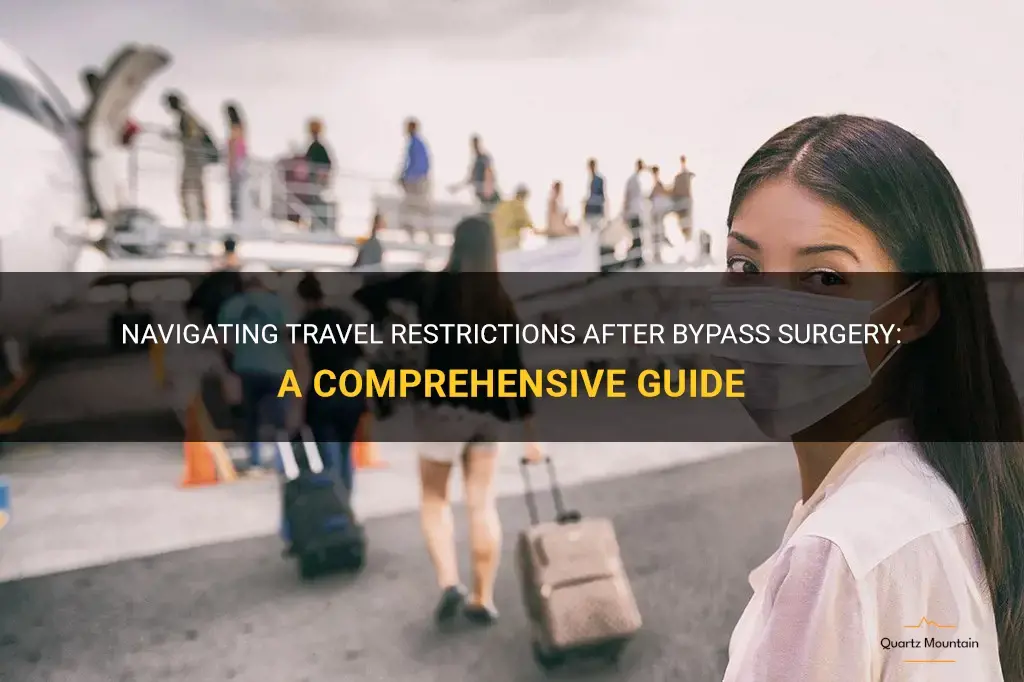
After undergoing bypass surgery, it is important to prioritize your health and well-being by making certain lifestyle changes. One of these changes might be a temporary restriction on travel. While the desire to explore new places and experience different cultures is undoubtedly strong, it is essential to understand the potential risks and limitations that come with traveling after such a major surgery. By adhering to the advice of your healthcare team and taking necessary precautions, you can still embark on incredible journeys while ensuring your recovery remains on track.
What You'll Learn
- How soon after bypass surgery can I start traveling again?
- Are there any specific travel restrictions or guidelines I should follow after bypass surgery?
- Are there any destinations or types of travel that should be avoided after bypass surgery?
- What precautions should I take while traveling, such as carrying medication or medical records?
- How can I ensure that I have access to necessary medical care or emergency assistance while traveling post-bypass surgery?

How soon after bypass surgery can I start traveling again?
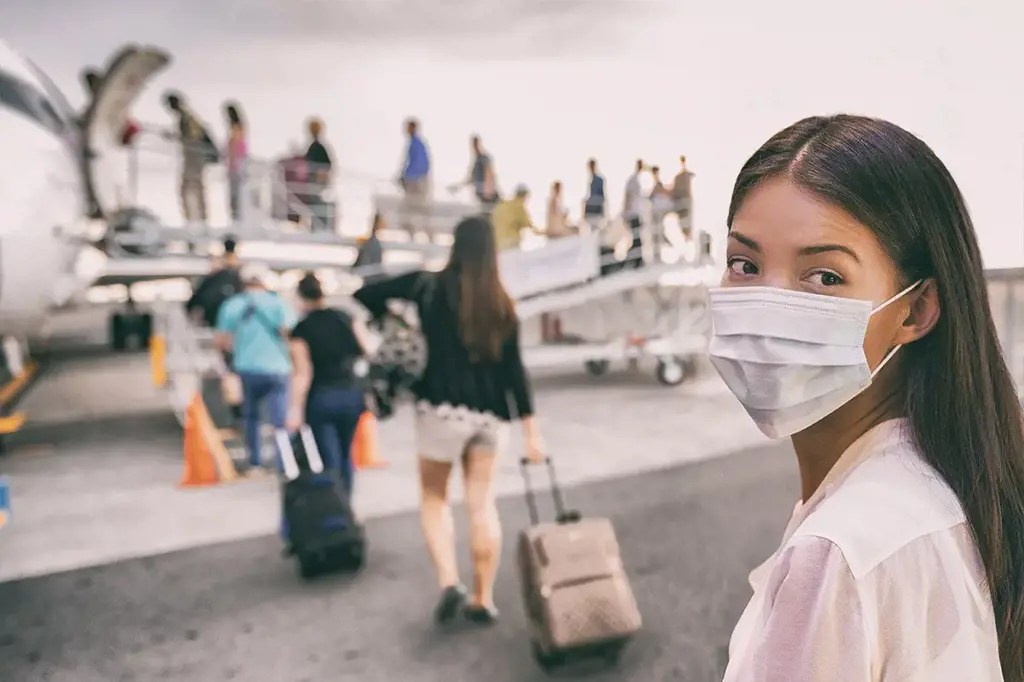
After undergoing bypass surgery, it is natural to have concerns about resuming your normal activities, including traveling. Traveling can be physically and emotionally demanding, and it is important to give your body enough time to heal before embarking on any trips. In this article, we will discuss how soon after bypass surgery you can start traveling again, taking into account scientific guidelines, personal experiences, and step-by-step recommendations.
First and foremost, it is essential to consult with your healthcare provider before making any decisions about traveling after bypass surgery. They will be able to assess your individual condition and make specific recommendations based on your recovery progress. It is important to remember that every case is unique, and what works for one person may not be suitable for another.
In general, it is recommended to wait at least six to eight weeks after bypass surgery before considering any travel plans. This timeframe allows your body to heal and regain its strength. However, this is just a general guideline, and your healthcare provider may suggest a longer or shorter waiting period based on your specific circumstances.
During the initial stages of recovery, it is crucial to prioritize rest and avoid any activities that may strain your body. This includes long-distance travel, which can be physically challenging, even for individuals without a history of heart surgery. It is also important to consider the psychological impact of traveling. The stress and anxiety associated with travel may impede your recovery process and hinder your overall well-being.
Once you have been cleared by your healthcare provider to resume travel, it is important to take certain precautions to ensure a safe and comfortable journey. Here are some step-by-step recommendations to guide you:
- Start with short trips: Begin by planning short trips close to home to test the waters and see how your body responds. This will allow you to gauge your stamina and make any necessary adjustments to your travel plans.
- Choose a comfortable mode of transportation: Opt for a mode of transportation that allows for frequent breaks and the ability to move around. Avoid long drives or flights that can be exhausting and put unnecessary strain on your body.
- Pack necessary medications and medical documentation: Don't forget to bring an ample supply of any medications you need, as well as copies of your medical records and contact information for your healthcare provider. It is also a good idea to have this information stored electronically in case of emergencies.
- Notify your airline or travel provider: If you are planning to travel by air or any other form of public transportation, it is advisable to inform the airline or travel provider about your recent surgery. They may be able to provide assistance or make any necessary accommodations to ensure a smooth journey.
- Take frequent breaks: During your trip, make sure to take regular breaks to rest and stretch. Prolonged periods of sitting can increase the risk of blood clots, so it is important to keep your blood flowing by moving around whenever possible.
- Listen to your body: Pay close attention to how your body feels during and after travel. If you experience any chest pain, shortness of breath, or other concerning symptoms, seek medical attention immediately.
It is important to remember that bypass surgery is a major procedure, and it takes time for your body to fully recover. While it is natural to want to resume your normal activities as soon as possible, it is crucial to prioritize your health and well-being. By following the guidelines and recommendations provided by your healthcare provider and taking necessary precautions during travel, you can gradually ease back into your regular routine and enjoy future adventures with peace of mind.
Current England to Spain Travel Restrictions: What You Need to Know
You may want to see also

Are there any specific travel restrictions or guidelines I should follow after bypass surgery?

After undergoing bypass surgery, it is important to follow certain travel restrictions and guidelines to ensure a safe and smooth recovery. These restrictions are in place to minimize the risk of complications and allow your body to heal properly. Here are some important things to keep in mind when traveling after bypass surgery:
- Consult with your doctor: Before making any travel plans, it is essential to consult with your doctor and get their approval. They will assess your current health condition and provide you with specific guidelines based on your individual needs.
- Timing of travel: Generally, it is recommended to avoid any extensive traveling for at least 4-6 weeks after bypass surgery. This is the critical period when your incision sites are healing, and your body is adapting to the changes made during the surgery. Traveling during this time may put undue stress on your body, increasing the risk of complications.
- Mode of transportation: When choosing your mode of transportation, it is important to consider the potential stress it may cause on your body. Avoid long flights or road trips that involve extended periods of sitting or standing. Opt for shorter flights or train journeys if possible, and take frequent breaks to stretch your legs and reduce the risk of blood clots.
- Medications and supplies: If you are on any medications, ensure you have an ample supply to last throughout your travel period. Carry your prescription with you, along with a list of your current medications, in case of any emergencies. It is also advisable to bring any necessary medical supplies, such as wound dressings or compression stockings, to maintain your post-surgical care routine.
- Hydration and nutrition: Staying hydrated and maintaining a healthy diet are crucial during your recovery period. When traveling, make sure to drink plenty of water and avoid excessive caffeine or alcohol consumption. Pack healthy snacks and meals, especially if you have dietary restrictions, to ensure you have access to nutritious options during your journey.
- Comfortable clothing and footwear: Choose loose-fitting and comfortable clothing for your travel, especially around the incision sites. Avoid tight or restrictive clothing that may irritate your wounds or cause discomfort. Opt for supportive and comfortable footwear to reduce the risk of foot or leg swelling.
- Gradual increase in activity: While traveling, listen to your body and gradually increase your activity level. Avoid strenuous activities or heavy lifting during your journey. It is important to pace yourself and take breaks whenever needed. If you experience any chest pain, shortness of breath, or other concerning symptoms, seek medical attention immediately.
Remember, everyone's recovery after bypass surgery is unique, so it is important to follow your doctor's specific guidelines. By taking these travel restrictions and guidelines into account, you can ensure a safe and smooth recovery while still being able to enjoy your travels.
Understanding the Current Travel Restrictions in Northern Cyprus
You may want to see also

Are there any destinations or types of travel that should be avoided after bypass surgery?
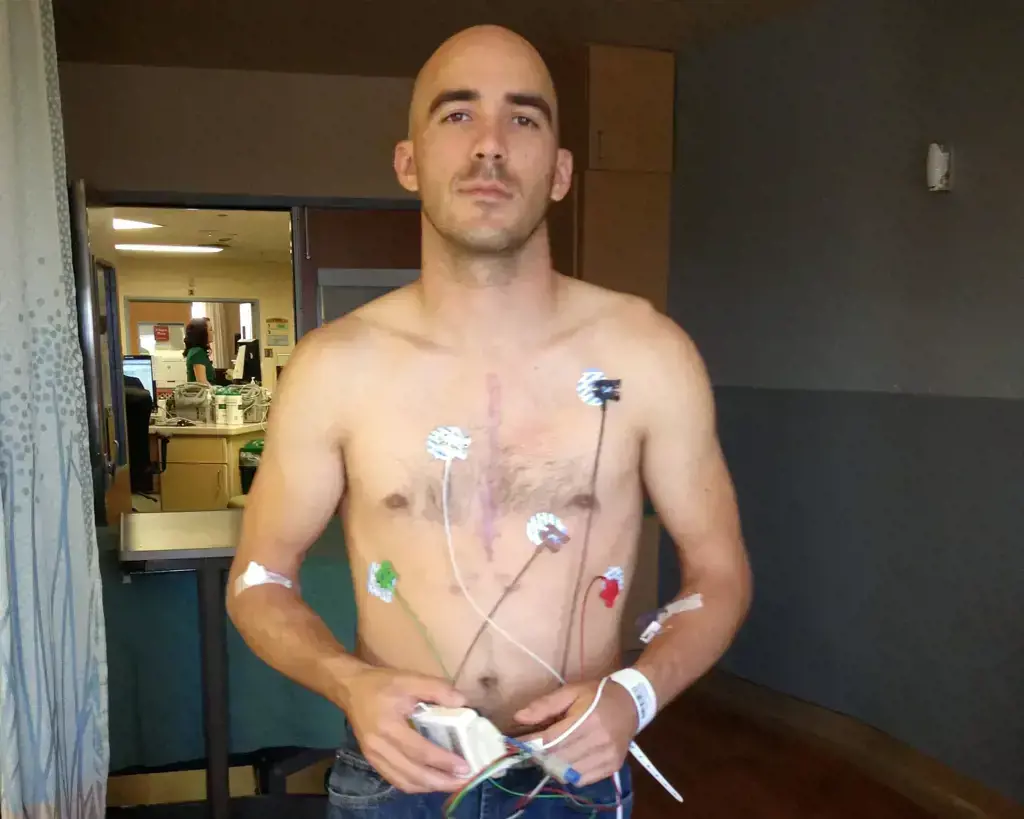
After undergoing a bypass surgery, it is important for patients to take certain precautions and make informed choices about their travel plans. While there are no specific destinations or types of travel that should be completely avoided, it is essential to consider a few factors to ensure a safe and enjoyable trip.
The first thing to consider is the mode of transportation. Long flights or car rides can put strain on the body and increase the risk of blood clots. It is advisable to consult with your doctor before planning a trip involving long journeys, especially if you have recently undergone surgery. They may recommend taking breaks during long flights or opting for shorter travel distances.
Another important consideration is the destination itself. It is recommended to avoid traveling to remote areas or locations with limited medical facilities. In case of any complications or emergencies, it is best to be in a place where medical assistance can be easily accessed. Choosing popular tourist destinations or well-developed cities can provide peace of mind knowing that help is nearby if needed.
Extreme climates and high altitudes can also pose risks to post-surgery patients. Extreme heat or cold can put additional stress on the body and affect its ability to heal. Similarly, traveling to high-altitude destinations can impact the cardiovascular system, making it harder for the heart to pump blood efficiently. It is important to be aware of these factors and consider destinations with moderate climates and lower altitudes to minimize any potential risks.
It is also advisable to carry essential medications, such as blood thinners or beta-blockers, while traveling. It is essential to maintain regular medication routines and ensure an adequate supply is available throughout the trip. Consulting with your doctor prior to traveling can help determine the necessary precautions and guidance on medication adjustments if needed.
Furthermore, it is important to listen to your body during the trip and take breaks whenever necessary. Overexertion or strenuous activities should be avoided, as it can put additional strain on the heart. Engaging in light exercises, such as walking or stretching, can promote blood circulation and aid in the healing process.
To illustrate these considerations, let's take the example of a patient who recently underwent bypass surgery and wants to plan a trip to a tropical island. The patient first consults with their doctor to get clearance for travel and receives advice on the best practices to follow. They opt for a well-developed island with good medical facilities and moderate climate. They take breaks during the long flight to reduce the risk of blood clots and ensure they have an adequate supply of necessary medications. While on the island, they avoid strenuous activities but engage in light exercises like morning walks on the beach. They also remain attentive to their body's signals and rest whenever necessary.
In conclusion, while there are no specific destinations or types of travel that should be completely avoided after bypass surgery, it is crucial to consider certain factors to ensure a safe and enjoyable trip. Consultation with a doctor, choosing well-developed destinations, avoiding extreme climates and high altitudes, carrying essential medications, and listening to your body are all essential steps to ensure a smooth and worry-free post-surgery travel experience.
Understanding the Florida to Michigan Travel Restrictions: What You Need to Know
You may want to see also

What precautions should I take while traveling, such as carrying medication or medical records?
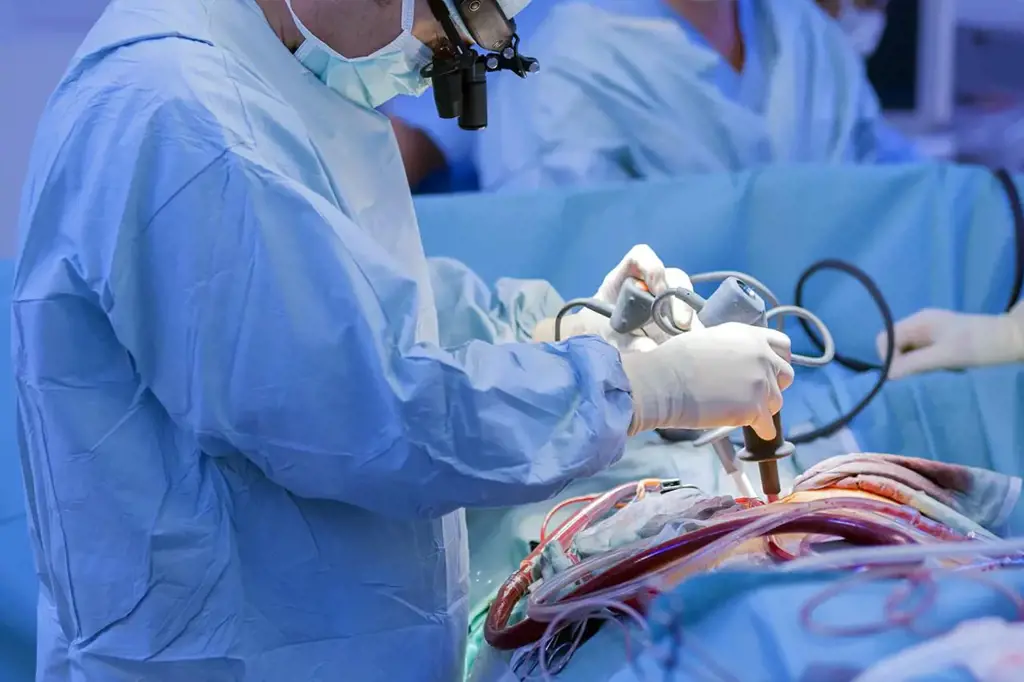
Traveling is a wonderful opportunity to explore new places and experience different cultures. However, it's important to take certain precautions to ensure a safe and healthy journey. One important aspect to consider is carrying medication and medical records.
First and foremost, it is crucial to consult with your healthcare provider before embarking on a trip. They can provide valuable guidance on the specific medications you should carry and any necessary vaccinations or precautions for your destination. If you have any existing medical conditions, make sure to discuss them with your healthcare provider as well.
When packing your medication, be sure to carry an ample supply to last for the duration of your trip, including some extra in case of unexpected delays. It's always a good idea to pack your medications in your carry-on bag or hand luggage, rather than checking them in with your main luggage. This way, you'll have easy access to them during the journey and won't risk losing them if your checked luggage gets misplaced.
In addition to packing your medications, it's advisable to bring a copy of your prescriptions or a doctor's note stating the need for these medications. This can be helpful in case you need to purchase more medication abroad or if you are questioned by authorities about the legality of carrying certain medications. It's also recommended to keep a list of emergency contact numbers for your healthcare provider and any other specialists you may be seeing.
If you have any allergies or medical conditions that require special attention, consider wearing a medical alert bracelet or carrying a medical ID card. This will help alert medical personnel in case of an emergency and provide them with important information about your condition and any necessary treatment.
While traveling, it's important to be aware of any potential health risks at your destination. Research the specific health concerns of the country or region you are visiting and take appropriate precautions. This may include vaccinations, taking anti-malarial medication, or avoiding certain foods or activities that could put your health at risk.
If you are traveling to a country where you don't speak the local language, it's useful to have a basic medical translation card with you. This card should include information about your allergies, medical conditions, and any medications you are taking. It can be particularly helpful in case of a medical emergency when you need to communicate these important details to healthcare providers who may not understand your language.
In summary, taking precautions while traveling, such as carrying medication and medical records, is crucial for a safe and healthy journey. Consult with your healthcare provider before your trip, pack an ample supply of medication, carry a copy of your prescriptions or doctor's note, and be prepared for potential health risks at your destination. By taking these steps, you can ensure that your travel experience is enjoyable and worry-free.
Navigating South Sudan: Understanding the Country's Travel Restrictions
You may want to see also

How can I ensure that I have access to necessary medical care or emergency assistance while traveling post-bypass surgery?
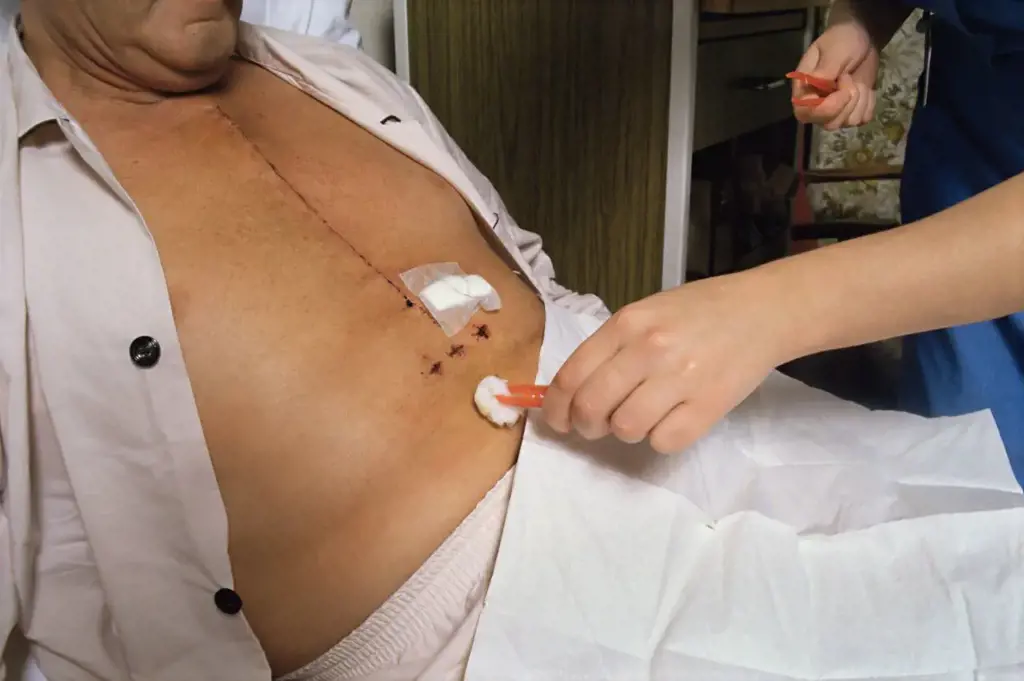
Traveling can be an exciting and memorable experience, but it's important to be prepared for any potential medical emergencies or health concerns that may arise, especially if you have recently undergone bypass surgery. Here are some steps you can take to ensure you have access to necessary medical care and emergency assistance while traveling post-bypass surgery.
- Consult with your doctor before traveling: Before embarking on any travel plans, it's crucial to consult with your doctor and seek their advice. They can assess your overall health condition and provide guidance on whether you are fit to travel. They may also recommend any precautions or specific measures you need to take while traveling, such as carrying certain medications or avoiding strenuous activities.
- Research medical facilities at your destination: It's essential to be aware of the availability and quality of medical facilities at your travel destination. Research and identify hospitals, clinics, and healthcare providers in the area where you will be staying. Look for facilities that have experience in treating heart-related conditions or have cardiac specialty departments. This information can be easily found online or by contacting the local tourism office of your destination.
- Carry essential medical documents: Make sure to keep copies of your medical records, including your bypass surgery details, current medications, and any other relevant medical information. It's recommended to carry these documents both in digital format on your smartphone or tablet and in hard copy, just in case. This way, you will have all the necessary information readily available in case of an emergency or if you need to seek medical assistance while traveling.
- Purchase travel health insurance: Invest in a comprehensive travel health insurance policy that covers any pre-existing medical conditions, including your bypass surgery. Read the policy carefully to understand what medical expenses are covered and the process for reimbursement. Remember to carry the insurance documents with you and keep the contact details of the insurance provider easily accessible.
- Carry an emergency contact card: Create a simple card with your emergency contact information, including your name, blood type, allergies, any current medications, and the contact details of your primary care physician. Keep this card in your wallet or purse, as it can be vital for emergency medical personnel to have this information if you are unable to communicate during an emergency situation.
- Pack necessary medications: Ensure you have an adequate supply of your prescribed medications for the entire duration of your trip. Keep them in their original packaging, clearly labeled, and pack them in your carry-on bag to avoid any loss or delays due to baggage mishaps. If you have any doubts about traveling with certain medications, consult with your doctor or pharmacist before departure.
- Stay hydrated and be mindful of your diet: While traveling, it's crucial to stay hydrated and make healthy food choices. Dehydration can put extra strain on your cardiovascular system, so drink plenty of water and avoid excessive alcohol or caffeine consumption. Be mindful of your diet and try to maintain a heart-healthy eating plan, even when indulging in local cuisine.
- Be cautious and listen to your body: Pay attention to your body's cues and be cautious during your travels. Avoid overexertion or engaging in strenuous activities that may put unnecessary strain on your heart. It's essential to pace yourself and take breaks when needed. Listen to any warning signs or symptoms your body may be sending, such as shortness of breath, fatigue, or chest pain. If any concerning symptoms arise, seek medical attention promptly.
Remember, each individual's post-bypass surgery recovery and travel capabilities may vary. Always follow the guidance and recommendations of your healthcare provider when it comes to traveling post-bypass surgery. By taking these steps and being prepared, you can enjoy your travels with peace of mind, knowing that you have access to necessary medical care and emergency assistance if needed.
Understanding the Current Travel Restrictions from Germany to India: All You Need to Know
You may want to see also
Frequently asked questions
It is generally safe to travel internationally after bypass surgery, but it is important to consult with your doctor before making any travel plans. Your doctor can assess your specific health condition and provide guidance on whether it is safe for you to travel, what precautions you should take, and any necessary recommendations for your specific destination.
When traveling after bypass surgery, there are several precautions you can take to ensure a safe and comfortable journey. It is important to stay well-hydrated, as dehydration can strain the heart. Additionally, make sure to avoid heavy lifting and strenuous activities during travel. It may also be beneficial to wear compression stockings to improve blood circulation and reduce the risk of blood clots, especially during long flights or car rides. Finally, it is important to have a plan in place in case of a medical emergency, including carrying necessary medications and ensuring you have access to medical care at your travel destination.
In general, there are no specific travel restrictions or limitations after bypass surgery. However, it is important to listen to your body and not overexert yourself during travel. It is also essential to follow any medication regimens prescribed by your doctor and to continue attending follow-up appointments as scheduled. Your doctor may recommend avoiding certain activities or destinations, depending on your individual health condition and recovery progress.
The timing of when you can travel after bypass surgery will depend on several factors, including your individual health condition and recovery progress. It is important to consult with your doctor before making any travel plans. In general, it is recommended to wait at least 4-6 weeks after surgery before undertaking any long-distance travel. This allows time for your body to heal and reduces the risk of complications during travel.







